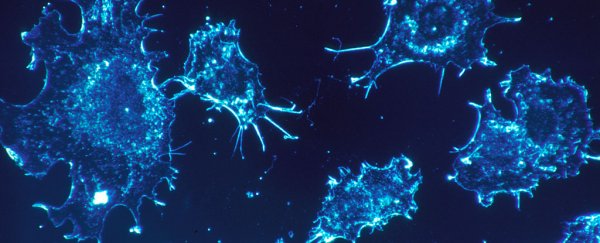Almost two-thirds of cancer mutations are caused by random DNA-copying errors during cell division and are impossible for us to avoid, regardless of lifestyle and the genes we inherit from our parents, according to new research.
The findings – which estimate that 66 percent of cancer mutations are effectively bad luck that we can't do anything about – support the conclusions of a controversial paper released in 2015 by the same researchers, which came under fire for appearing to suggest that there was nothing we could do to prevent various cancers.
This time around, the team from Johns Hopkins University are at pains to emphasise that their findings don't contradict what we know about cancer prevention – nor detract from the importance of environment and heredity in terms of causing cancer.
"It is well-known that we must avoid environmental factors such as smoking to decrease our risk of getting cancer. But it is not as well-known that each time a normal cell divides and copies its DNA to produce two new cells, it makes multiple mistakes," says biostatistician Cristian Tomasetti.
"These copying mistakes are a potent source of cancer mutations that historically have been scientifically undervalued, and this new work provides the first estimate of the fraction of mutations caused by these mistakes."
When Tomasetti and geneticist Bert Vogelstein last examined the role of these random mutations driving cancer growth, they were criticised for only examining US heath data – and for not providing results on breast or prostate cancer.
In the new study, to broaden the scope of their original findings, they examined medical data from 68 countries on 32 types of cancer – including breast and prostate – to find what proportion of mutations that cause cancer are due to random mistakes made during DNA copying.
The team found that the extent to which random mutations contribute to cancer growth differs between each kind of cancer, but it certainly looks to be a significant factor.
In the case of pancreatic cancer, the researchers say that 77 percent of the mutations that cause tumours are due to random DNA copying mistakes, whereas 18 percent are down to environmental factors, with inherited genes accounting for the remaining 5 percent.
In other cancers – including prostate, brain, and bone cancer – the researchers found that 95 percent of cancer mutations are a result of cell division errors.
For some cancers, though, bad luck appears to play a smaller role.
In lung cancer, 65 percent of mutations are due to environment – such as smoking, or living in a polluted area – whereas DNA copying errors account for the other 35 percent, with heredity playing no role.
Overall, the team estimates that 66 percent of cancer mutations are due to random, unavoidable mistakes made during cell division, with 29 percent being attributable to environment, and 5 percent being inherited.
Despite the controversy that greeted their results last time, the authors say their findings actually complement the scientific consensus on cancer: that approximately 40 percent of cases can be prevented.
"We need to continue to encourage people to avoid environmental agents and lifestyles that increase their risk of developing cancer mutations," says Vogelstein.
"However, many people will still develop cancers due to these random DNA copying errors, and better methods to detect all cancers earlier, while they are still curable, are urgently needed."
Despite the sweeping nature of the new analysis, not everybody is convinced by the new findings.
Some researchers say it's too simplistic to arbitrarily conclude that cancer as a whole can be divvied up neatly into three key categories – random mutations, environment, and heredity – arguing that the interplay between these factors could itself be another contributor.
"We're not saying the only thing that determines the seriousness of the cancer, or its aggressiveness, or its likelihood to cause the patient's death, are these mutations," Vogelstein told Richard Harris at NPR.
"We're simply saying that they are necessary to get the cancer."
If the findings end up being accepted by other cancer researchers, the idea that randomness – in other words, bad luck – is more significant in causing cancer than other contributing factors could amount to what Tomasetti calls "a complete paradigm shift in how we think about cancer and what causes cancer".
On one hand, it could make it easier for cancer patients and their families to process their diagnoses – especially in cases where conscious lifestyle choices (to not smoke, or to eat healthily) weren't rewarded.
"They need to understand that these cancers would have happened no matter what they did," Vogelstein told media at a press conference on Thursday.
"We don't need to add guilt to an already tragic situation."
The findings could also help steer research to investigate the biological processes behind random mutations that we don't currently understand. While there's nothing we can do to prevent natural DNA copying mistakes made at the cellular level today, that might not always be the case.
"Something we don't consider a modifiable risk factor today might look modifiable in the future," geneticist Paul Meltzer from the US National Cancer Institute's Centre for Cancer Research, who wasn't involved with the study, told the Los Angeles Times.
"What we call the 'bad luck' in the gene replication, we may have ways to reduce that in the future."
The findings are reported in Science.
